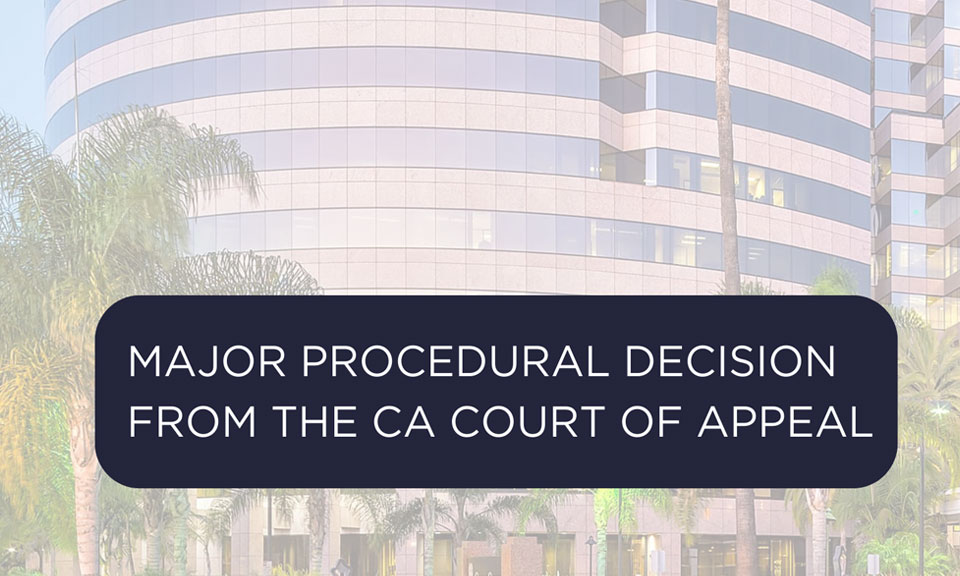
The California Court of Appeal, Second Appellate District issues peremptory writ of mandate commanding the WCAB to comply with Labor Code Section 5908.5 and issue a substantive decision when granting Petitions for Reconsideration; Petitions for Reconsideration pending final decisions will not be dismissed under Labor Code Section 5909.
Petitioners sought Writ of Mandate from the California Court of Appeal seeking relief and arguing the Workers’ Compensation Appeals Board (Board) violated the statutory procedure to act on Petitions for Reconsideration within 60 days. The relief sought was in response to five cases where the Board granted the petitioners’ request for reconsideration but only for “further study” without providing a substantive basis for granting the request. The Court of Appeal issued an order to the Board to cease and desist such practices and to state in detail the reasons for its decision to grant reconsideration and the evidence supporting the decision. See Le Vesque v. Workers’ Comp. Appeals Bd. (1970) 1 Cal.3d 627, 634–635 & fn. 11 (Le Vesque); Evans v. Workmen’s Comp. Appeals Bd. (1968) 68 Cal.2d 753, 754–755 (Evans); Hall, supra, 179 Cal.App.3d at pp. 858–859; Zozaya v. Workmen’s Comp. Appeals Bd. (1972) 27 Cal.App.3d 464, 471, fn. 2, 472 (Zozaya); Solomon v. Workmen’s Comp. Appeals Bd. (1972) 24 Cal.App.3d 282, 284–286 (Solomon).) The Court of Appeal clarified the Board does not need to make a final decision within 60 days.
The Court of Appeal further clarified the application of Labor Code Section 5909, which states “[a] petition for reconsideration is deemed to have been denied by the appeals board unless it is acted upon within 60 days from the date of filing.” The Court of Appeal opines that section 5909 does not require the Board to issue a final decision on the merits of a petition within 60 days[1]. It only needs to “act”. In the same vein, the Court of Appeal reconciles Labor Code Sections 5907 and 5906, stating “[i]f, at the time of granting reconsideration, it appears to the satisfaction of the appeals board that no sufficient reason exists for taking further testimony, the appeals board may affirm, rescind, alter, or amend” the workers compensation judge’s decision, and “may” without further proceedings or notice “enter its findings, order, decision, or award based upon the record in the case.” Section 5907’s use of the volitional term “may” does not preclude the Board from issuing a later, final decision on the merits after reconsideration even without additional evidence. That reading is consistent with section 5906[2], which … permits “further proceedings” after granting reconsideration followed by a final order “on the basis of the evidence previously submitted in the case.” The permissive language of the statute grants the Board with the power to later issue substantive decision on the merits, with or without additional evidence.[3]
[1] Section 5909 simply requires that the Board “act[ ] upon” a petition for reconsideration within 60 days by granting or denying the petition, not by finally deciding the merits.
[2] Section 5906 states that, “[u]pon the filing of a petition for reconsideration, or having granted reconsideration upon its own motion, the appeals board may, with or without further proceedings and with or without notice affirm, rescind, alter, or amend” a workers’ compensation judge’s order “on the basis of the evidence previously submitted in the case, or may grant reconsideration and direct the taking of additional evidence.”
[3] See Argonaut Ins. Exchange v. Industrial Acci. Comm. (1958) 49 Cal.2d 706, the Board may initially grant reconsideration and later issue a ruling on the merits determining any issues that the Board has the statutory power to decide, without additional proceedings and without ordering additional evidence
[1] Section 5909 simply requires that the Board “act[ ] upon” a petition for reconsideration within 60 days by granting or denying the petition, not by finally deciding the merits.
[2] Section 5906 states that, “[u]pon the filing of a petition for reconsideration, or having granted reconsideration upon its own motion, the appeals board may, with or without further proceedings and with or without notice affirm, rescind, alter, or amend” a workers’ compensation judge’s order “on the basis of the evidence previously submitted in the case, or may grant reconsideration and direct the taking of additional evidence.”
[3] See Argonaut Ins. Exchange v. Industrial Acci. Comm. (1958) 49 Cal.2d 706, the Board may initially grant reconsideration and later issue a ruling on the merits determining any issues that the Board has the statutory power to decide, without additional proceedings and without ordering additional evidence


